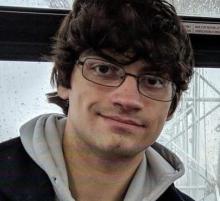The Clean Energy Scientific Achievement Award recognizes UW graduate students who have demonstrated extraordinary productivity in clean energy research and scholarship, and have contributed meaningfully to the scientific community.
John Cenker is a fifth-year Ph.D. student in physics and a 2021-22 CEI Graduate Fellow, advised by CEI faculty member and professor of materials science & engineering and physics Xiaodong Xu. His thesis work includes several breakthroughs in 2D magnetic semiconductors, which could revolutionize energy-efficient electronics, photonics, memory, and computing technologies.
“It’s an honor to be recognized by CEI,” said Cenker. “As an undergrad, I was curious about new materials for energy applications, and it’s not uncommon for graduate students to lose sight of that when immersed in their research. But the Grad Fellowship reminded me of the big picture, and inspired me to think outside the box. It was also gratifying to engage young students with science!”
Notably, Cenker invented a technique to use mechanical strain to reversibly change the magnetic phase within a particular 2D semiconducting material, chromium sulfide bromide. CrSBr is an antiferromagnet, a type of magnetic material with the spins of its electrons aligned opposite to those of their neighbors, producing a net zero effect. But when he applied physical tension, not unlike a finger trap or a game of tug-of-war, he observed that the spins of the electrons within the material aligned to produce the familiar ferromagnetism — and reverted back when the tension was eased. Harnessing full control of the spins of electrons within semiconductors would mean information could be represented without having to move charge-carrying particles through physical features on a chip, a fundamental concept underpinning modern electrical and computer engineering.
A patent is pending for the strain device, and Cenker was invited to submit a single-author paper in Nature Review Physics on the topic. He has published five first- or co-first-author papers in Nature Physics, Nature Materials, and Nature Nanotechnologies while at the UW.
“John has shown exceptional creativity, independence, and motivation in research,” said Xu. “He has the personality to collaborate with anyone, and has been a terrific role model for several graduate, undergraduate, and high school students in our lab. For instance, an undergraduate student who he mentored for his thesis research is now pursuing a Ph.D. at Princeton Physics. These traits are major assets for a successful career as a PI!”
Cenker will complete his Ph.D. in 2023, and will continue his research into 2D materials as a postdoctoral researcher at Columbia University, advised by physics professor Cory Dean. The UW is a partner in the U.S. DOE Energy Frontiers Research Center (EFRC) on Programmable Quantum Materials (Pro-QM), which is hosted by Columbia. Xu leads the UW thrust, which includes CEI Member Faculty Alexandra Velian, Jiun-Haw Chu, David Cobden, and Matthew Yankowitz.
Read more at the CEI website.
